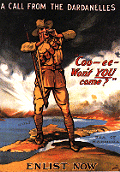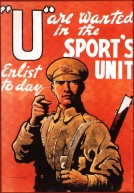WHY DID THEY SERVE?
 That is not an easy question to answer of
course, as we today are not in their same situation. As Aboriginals, they were not
classified as citizens of Australia, they could not drink alcohol, vote, marry
non-Aboriginals or buy property. They would have been like every other adventurous
young Australian male, wanting to go out and see the world, get paid really good money,
see some action and 'be home before Christmas'.
That is not an easy question to answer of
course, as we today are not in their same situation. As Aboriginals, they were not
classified as citizens of Australia, they could not drink alcohol, vote, marry
non-Aboriginals or buy property. They would have been like every other adventurous
young Australian male, wanting to go out and see the world, get paid really good money,
see some action and 'be home before Christmas'.
But these boys stood out in the
crowd, they were Aboriginal. . .they put up with racist slurs and attitudes almost daily
in their civilian life - but to their mates in the trenches they were Mick, Ben and Harry.
The misconceptions and negative stereotypes that surely many non-Aboriginal diggers
had in their minds when they joined would have quickly disappeared when they were living,
eating, laughing and dying with these young fellas.
But the most tragic aspect of their service was
not in them 'going over the top' and running at machine guns and dying - it came after
they returned to their country.
When they came back home to Australia they were
shunned, their sacrifices ignored and their families oppressed even further by their
respective State and Federal governments with such cruel initiatives as the "Soldier
Settlement Scheme" and official assimilation policies. Returned soldiers were
not allowed to have a drink with their comrades at their local pub, their children were
being taken away and there was no Government support for the wounded or mentally scarred
veterans.

The service that these warriors did for an
ungrateful nation helped provide momentum to the growing Aboriginal Rights Movement in the
1930's. They provided hard evidence that we as a people were willing
to serve Australia for the better, but white Australia was not willing to help us improve
our way of life.
Eventhough their small number (estimated to be
300-500) seem like a drop in the bucket of the tens of thousands of Australians who served
in World War One, their significance to modern Aboriginal history is immense. Today
the bodies of those that fell in the battlefields of France and Belguim remain with their
mates, thousands of miles away from their ancestral homes.
Garth O'Connell 1998©
Main Page
 That is not an easy question to answer of
course, as we today are not in their same situation. As Aboriginals, they were not
classified as citizens of Australia, they could not drink alcohol, vote, marry
non-Aboriginals or buy property. They would have been like every other adventurous
young Australian male, wanting to go out and see the world, get paid really good money,
see some action and 'be home before Christmas'.
That is not an easy question to answer of
course, as we today are not in their same situation. As Aboriginals, they were not
classified as citizens of Australia, they could not drink alcohol, vote, marry
non-Aboriginals or buy property. They would have been like every other adventurous
young Australian male, wanting to go out and see the world, get paid really good money,
see some action and 'be home before Christmas'.